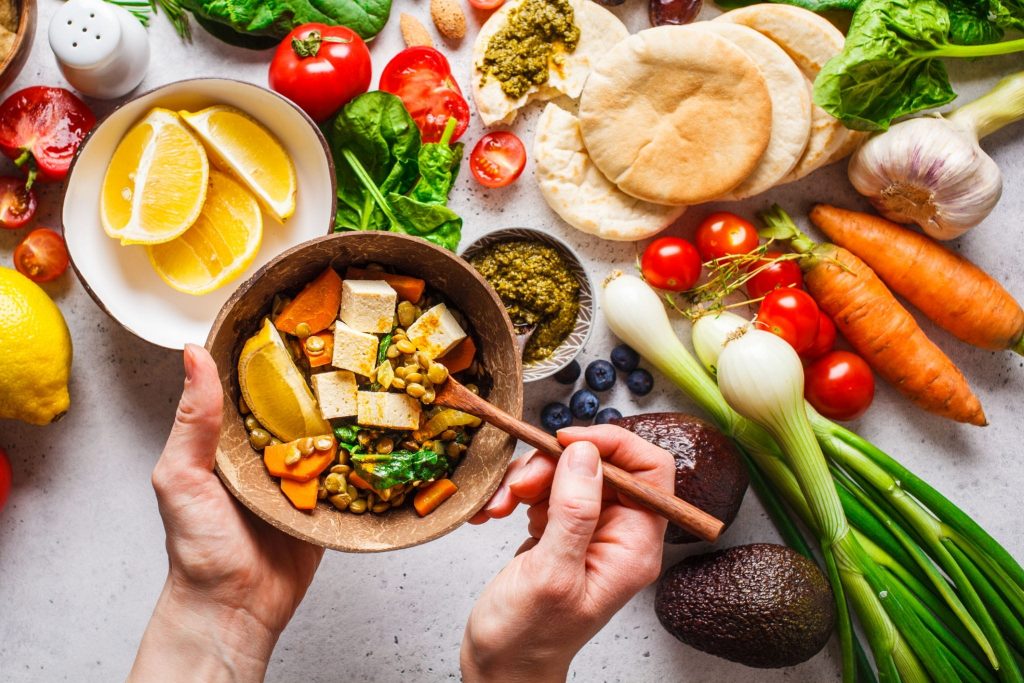How hard is it to get calcium for vegans?
The truth is that there are actually so many plant-based foods rich in calcium. While this mineral is commonly found in dairy, there are best vegan sources of calcium that are not from animal products.
With this in mind, you should be able to get your daily requirement for this nutrient. You can prevent calcium deficiency by simply incorporating these foods in your diet each day.
What are these foods, you may ask? Well, that’s what we’ll cover today – a list of 9 of the best plant based foods to get your calcium from as a vegan! Let’s get started.
Calcium For Vegans – The Basics
First of all, you need to understand the importance of calcium in your body.
This nutrient helps to maintain strong bones. It is also crucial for normal blood clotting, nerve transmission, and muscle contraction.
According to the National Institute Of Health, adults need 1000 milligrams of calcium per day. For folks over 50, it goes up to 1200 milligrams. Kids between the ages of 4 and 18 need 1300 milligrams of this mineral daily.
Unfortunately, not many people meet the daily requirements because of their diet. This also happens to vegans who are not consuming dairy and animal products that are rich in calcium.
So how do vegans get calcium? We’ll cover this extensively in the next section.
Best Vegan Sources Of Calcium
If you are following a plant based diet, don’t fret – you can still get the required daily intake of calcium by eating any of the foods below. Here are the best vegan sources of calcium that you should eat today and everyday!
1. Legumes
Chickpeas and beans are excellent sources of calcium. In fact, a cup of cooked winged beans can give you up to 26 percent of calcium. White beans and navy beans contain 13 percent calcium while chickpeas offer 9 percent of this mineral.
Fortunately, this vegan source of calcium is easy to prepare and add to your diet. You can add them to your salad, burrito, or saute them with other vegetables.
In addition to calcium, legumes are a rich source of other essential minerals such as zinc, magnesium, iron, folate, and potassium. They are also high in fiber and protein, making them a powerhouse of nutrients to add to your daily menu.
2. Soy
If you love eating soy-based foods such as tofu and tempeh, then you are feeding your body with the calcium it needs. In fact, a cup of cooked soybeans offers up to 18.5 percent of the recommended daily intake for calcium.
Edamame has even more calcium content. About 175 grams of cooked edamame has 27.6 percent of calcium – a must-have in a vegan diet.
Other foods made of soybeans that are calcium-rich include natto and tempeh. They provide your body with 22 percent to 11 percent of the RDI, respectively.
Moreover, soybeans are a great source of vitamins and minerals. And if you need to boost your protein intake, these are the best foods to eat, as well. With a complete protein profile, your body can truly benefit from soybeans in your diet.
3. Nuts And Seeds
In need of a quick snack? Seeds and nuts are easy to munch, yet highly nutritious at the same time. These foods give your body as much as 10 percent of the total RDI for this mineral by simply consuming 1/4 cup.
The best nuts for calcium include Brazil nuts and almonds, which provide up to 6 percent of the RDI. Other nuts that are good to eat for your calcium needs are walnuts, hazelnuts, macadamia, and pistachios. A quarter of a cup of any of these nuts provide up to 3 percent of the RDI.
In addition to calcium, nuts offer healthy fats, protein, and fiber. They are also antioxidant-rich and loaded with B vitamins, as well as potassium, copper, selenium, vitamins K and E.
Aside from nuts, be sure to consume seeds such as sesame seeds and chia seeds, which are rich in calcium. Just 2 tablespoons of sesame seeds provide your body with up to 13 percent of the total RDI while chia seeds give you about 6 percent of the RDI for the same amount.
You can simply add seeds to your smoothie, cereal, and baked goodies. By consuming seeds and nuts, you are reducing your risk of heart disease, inflammation, and diabetes.
4. Seaweeds
If you love seaweeds, then you are doing your body a favor because of the calcium content in these sea vegetables.
Wakame, for instance, offers up to 12 percent of the RDI for each cup. You can eat it raw or add it to your soup.
To further increase your calcium intake from seaweeds, it may be worth eating some kelp, which you can also incorporate to your main dishes or salads. A cup of kelp gives you 14 percent of the RDI. As an alternative, you can also season your dishes with dried kelp flakes to add flavor and boost the calcium content.
Aside from calcium, seaweeds are rich in iodine. Just be sure not to consume too much of these sea vegetables to not overdo your iodine intake. A cup per day should suffice for your calcium and iodine needs.
5. Grains
You may be surprised to know that grains are a vegan source of calcium. Well, it is! Not all grains have calcium, yet you can go for those that are abundant in this nutrient such as teff and amaranth. They provide up to 12 percent of the RDI per cup.
As a bonus, you are also getting dietary fiber and protein from these grains.
Simply use teff to make porridge or substitute amaranth for your couscous or rice. Another way to use these is by milling them into a flour and using them to thicken your sauces or bake some goodies.
6. Fruits
They’re juicy and tasty and so healthy! Although not all fruits contain calcium, there are some that have a decent amount of this mineral in them.
Good sources of calcium are raw figs, which contain 18 milligrams of calcium. Then, there are oranges, which have up to 65 milligrams of this essential mineral. You can also get the same amount of calcium from a cup of blackcurrants, and slightly lower from raspberries and blackberries.
You can either munch these fruits fresh or add them to your smoothie for a quick and easy way to include them in your daily meals.
7. Leafy Greens
There’s no doubt that leafy greens are super healthy for you. But if you like to get maximum health benefits from greens, be sure to choose dark leafy ones, as well as cruciferous.
Spinach and mustard greens provide up to 142 milligrams of calcium, which is 14 percent of the RDI. Other excellent vegetables that are regarded for their calcium content include Brussels sprouts, broccoli, cabbage, and kale.
Do take note that these vegetables contain oxalates that prevent the absorption of nutrients. An effective way to decrease their oxalate levels is by boiling or steaming them. Give them a quick boil or steam, and this reduces oxalate by up to 87 percent.
8. Blackstrap Molasses
Move over white sugar – blackstrap molasses is an even better sweetener for you.
This is sourced from sugarcane and then boiled thrice. Yet, unlike plain sugar, blackstrap molasses contains up to 179 milligrams of calcium per tablespoon.
Aside from this mineral, it also provides your body with up to 15 percent of your body’s daily requirement for magnesium, vitamin B6, manganese, and selenium.
However, just like most sweeteners, blackstrap molasses is high in sugar. So, be sure to consume it in moderation.
9. Fortified Foods
Lastly, a quick way to get calcium in your diet as a vegan is by consuming fortified foods. These include yogurt and cereal that are fortified in this mineral, which offer your body higher levels of calcium.
In fact, you can get up to 30 percent of the RDI from a cup of plant-based milk fortified in calcium. The same holds true with fortified vegan yogurt or orange juice.
Make it a point to read labels to make sure that the plant based milk or yogurt in question is indeed fortified in this essential mineral.
Bottom Line
Calcium is a very important mineral to maintain the strength of your bones. You also need this nutrient for proper blood clot, blood sugar regulation, and muscle contraction.
So, make it a point to include these sources of calcium for vegans to prevent any deficiency to this mineral. With many easy ways to incorporate these foods in your diet, you can keep your calcium intake to the right levels and reap amazing health benefits!

